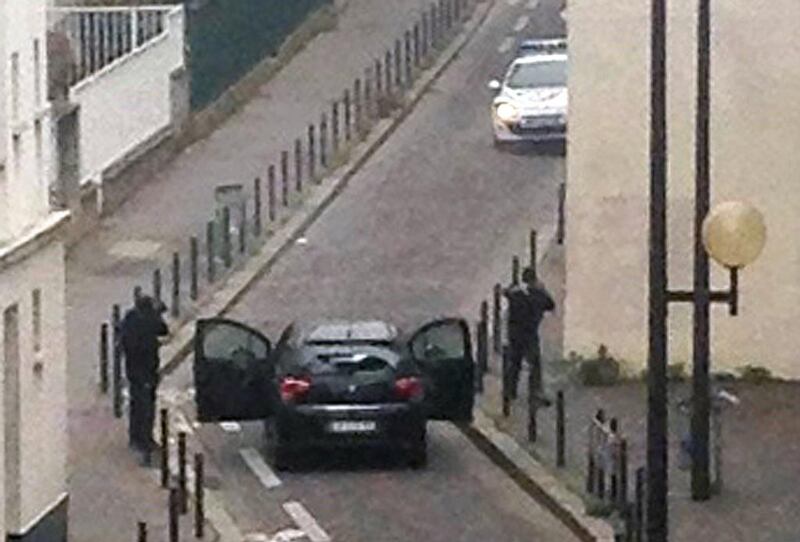PARIS // France raised its security alert to the highest level on Wednesday as police launched a manhunt for gunmen who killed a dozen people in an attack on the offices of a French magazine in Paris.
There was no immediate claim of responsibility for the attack on the satirical weekly Charlie Hebdo, which has drawn condemnation from Muslims in the past for publishing caricatures of the Prophet Mohammed.
At least two masked men with automatic weapons stormed the magazine’s office in central Paris at midday, killing the editor and other staff, as well as two policemen, before escaping in a getaway car, according to Paris prosecutor Francois Molins. Eleven people were injured, four critically, he said.
Among those killed were four of France’s most well-known cartoonists, as well as an economist who was a contributor to the magazine and was heard regularly on French radio.
Carol Rambot, who lives across from the magazine’s offices, described the killing of a policeman on the narrow street. She pointed to bullet holes peppered across the windows of a residential building not far from a police car left with about a dozen bullet holes across its windshield.
“They were blocked in by the police so they just started to walk forward from their car, very slowly, and were just shooting many rounds,” Ms Rambot said. “They wore all black, and their faces were covered. They just got into their car and drove way. You could tell that it was all very well planned.”
The black Citroen used by the attackers was later found abandoned about four kilometres away in north-east Paris. The gunmen then hijacked a grey Renault Clio to make their escape, losing police, Mr Molins said.
Another witness to the attack, Zena Meziane, said she heard heavy firing from her apartment and saw people emerging from the Charlie Hebdo offices covered in blood.
“There was so much shouting, so much chaos,” she said. “It was difficult to watch. It was really quite horrifying.”
It was not the first attack on the magazine, which has a reputation for mocking and baiting French Muslims. The old offices of the magazine were targeted in 2011, destroyed by a petrol bomb a day after it named Prophet Mohammed as its “editor-in-chief” for an issue. That forced the weekly to relocate to the offices where the attack took place on Wednesday.
The editor, Stephane Charbonnier, had received death threats and lived under police protection.
The magazine gained notoriety in 2006 when it reprinted cartoons of Prophet Mohammed that had originally appeared in Danish daily Jyllands-Posten. It later published several of its own controversial portraits of the Prophet, and has regularly critiqued Islam in its editorial pages.
The magazine’s cover this week features the new book, Submission, by Michel Houellebecq, which depicts a future France in the grip of an Islamic regime and a Muslim president who bans women from the workplace.
Another cartoon in this week’s issue was titled Still No Attacks in France, and included a caricature of an extremist fighter.
On Wednesday, shortly before the attack, the magazine posted online another cartoon depicting the ISIL chief Abu Bakr Al Baghdadi.
Charbonnier, who used the pen name Charb, had defended the cartoons.
“Mohammed isn’t sacred to me,” he had said in an interview with the Associated Press in 2012. “I don’t blame Muslims for not laughing at our drawings. I live under French law. I don’t live under Quranic law.”
Charlie Hebdo’s satire has also featured provocative cartoons of retired Pope Benedict XVI, former French president Nicolas Sarkozy and of an Orthodox Jew kissing a Nazi soldier.
Supporters of the ISIL militant group praised Wednesday’s attack on social media, some saying it was a well-deserved attack on France for allowing the magazine to mock the Prophet.
Meanwhile, the hashtag JeSuisCharlie was trending on Twitter as users expressed support for journalistic freedom.
Speaking near a barricaded metro station close to the scene, Dalil Boubakeur, the head of the French Council of the Muslim Faith, called the shooting a “declaration of war”.
“We are horrified by this brutality and savagery. We are stunned,” he said. “In Islam, human life is sacred. This is just unthinkable.”
The French president Francois Hollande also visited the scene to condemn the attack.
“An act of exceptional barbarity has been perpetrated against a newspaper, against liberty of expression, against journalists,” he said, adding that several possible attacks had been foiled in recent weeks.
Schools across Paris closed after the attack, while houses of worship, media offices and transportation were reinforced with police. Charles de Gaulle Airport also saw an enhanced police presence.
France is home to Europe’s largest Muslim population – more than 5 million out of a population of about 65 million.
The fear of “Islamisation” has found traction in France, with opinion polls showing the anti-immigration National Front party led by Marine Le Pen would lead in the first round of the 2017 presidential race.
Ms Le Pen said she was “horrified” by the attacks. “It will be time in the coming hours to question the seriousness of the threat and the resources used to fight against this threat,” she said.
foreign.desk@thenational.ae





